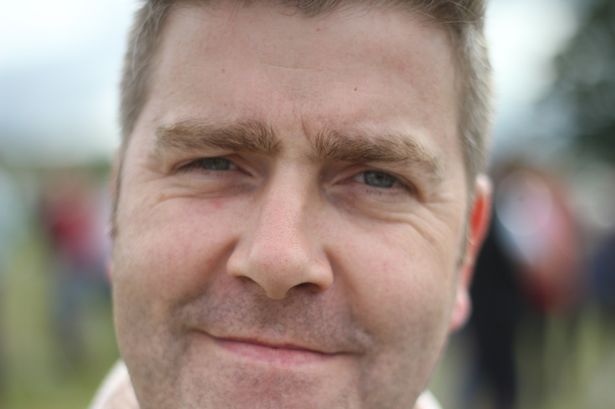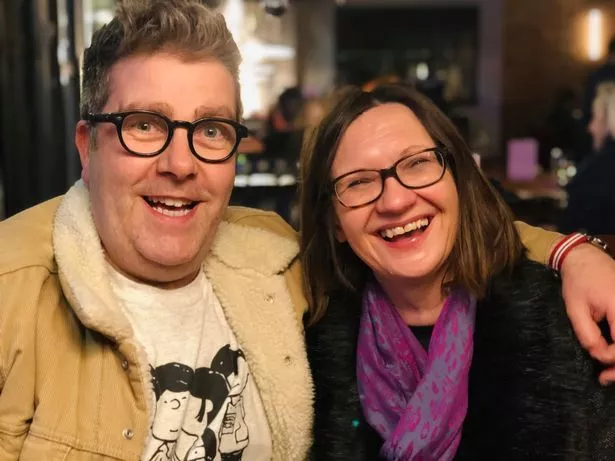David Burgess’ heartbroken partner is demanding answers and calling for urgent action to stop other families facing the same tragedy.
09:41, 21 Aug 2025Updated 14:26, 21 Aug 2025
 David Burgess(Image: PA)
David Burgess(Image: PA)
A woman has told how her partner was sent home from A&E with Gaviscon – only to die days later from a deadly condition she says is being missed far too often.
David Burgess, 52, from Sale in Greater Manchester, fell suddenly ill on April 24 this year when he developed severe pain in his stomach and back. The legal recruitment consultant, who was described as healthy, hardworking and “tough”, had rarely needed to see a doctor before.
The next day his partner Sandra O’Hagan, 56, took him to Wythenshawe Hospital’s A&E. There, he was diagnosed with gastritis – inflammation of the stomach lining – and told to take Gaviscon. He was discharged the same day.
 Sandra O’Hagan enjoying an evening out with David.(Image: PA)
Sandra O’Hagan enjoying an evening out with David.(Image: PA)
Sandra said: “Because it’s a doctor you think, well, it must be right. It can’t be that serious or they wouldn’t be sending him home. Looking back you think, why did we trust them? But you just do.”
David’s symptoms persisted over the following days. He struggled to eat, had no energy and his breathing became worse. On May 1, six days after his first visit, he returned to A&E. Tests revealed he was suffering from aortic dissection – a tear in the body’s main artery, which carries blood from the heart to the rest of the body.
He was rushed into surgery, but doctors warned his chances of survival were just 30%. After two major operations his condition deteriorated further. His heart and organs began to fail and a brain scan showed he had suffered several mini strokes.
On May 10, surrounded by Sandra, his parents and close family, the heartbreaking decision was made to turn off his life support.
Sandra said: “I just thought, how can this be happening? He went to A&E nearly a week ago and they sent him home. It was so unexpected – like a nightmare. On his final day we were all there. They told us it would be cruel to keep trying as they had done everything they could.”
The Aortic Dissection Charitable Trust says around 2,000 people a year die from the condition in the UK, and that around one in three cases are misdiagnosed. The charity believes 10 lives could be saved every week if the condition was spotted earlier.
Sandra is now exploring legal action against Manchester University NHS Foundation Trust, with the support of solicitors Enable Law. She is also campaigning to raise awareness of the condition, which she says is “flying under the radar”.
 Join the Daily Record WhatsApp community!
Join the Daily Record WhatsApp community!
Get the latest news sent straight to your messages by joining our WhatsApp community today.
You’ll receive daily updates on breaking news as well as the top headlines across Scotland.
No one will be able to see who is signed up and no one can send messages except the Daily Record team.
All you have to do is click here if you’re on mobile, select ‘Join Community’ and you’re in!
If you’re on a desktop, simply scan the QR code above with your phone and click ‘Join Community’.
We also treat our community members to special offers, promotions, and adverts from us and our partners. If you don’t like our community, you can check out any time you like.
To leave our community click on the name at the top of your screen and choose ‘exit group’.
If you’re curious, you can read our Privacy Notice.
She added: “With David, when they sent him away, that was it – that was his only chance. He had to be diagnosed there and then to survive. People need to know about this condition and doctors need to be better trained to spot it.”
Paying tribute, Sandra described David as warm, intelligent and funny. A keen vinyl collector and occasional cyclist, he loved his work and “never took a day off”.
Manchester University NHS Foundation Trust said: “We offer our sincere condolences to Mr Burgess’s family and friends. We are undertaking a review of his care and will share the findings with his family and the coroner.”

